On Sunday, September 2, 2012 Ethiopians and Africans officially bid farewell to Prime Minister Meles Zenawi during a state funeral in Addis Ababa. Mr. Zenawi died on August 20, 2012 after a battle with an illness that rapidly deteriorated his health in what seemed like a matter of weeks.
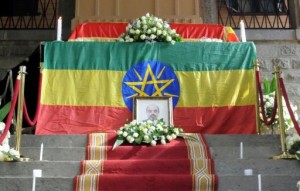
I am not sure if there has ever been an African leader who’s immediate death caused such uncertainty more so regionally than nationally. If you asked me a few months ago to imagine a post-Zenawi Ethiopia, it would have been quite hard for me to do so. For one thing, Mr. Zenawi was quite young compared to his African counterparts and due to his significant influence over the country, one would have a hard time thinking about Ethiopia without Mr. Zenawi and Mr. Zenawi without Ethiopia. However, from all the obituaries, narratives and analysis, the most common thread is the uncertainty that East Africa is left with as a result of the significant vacuum left by Mr. Zenawi. Ethiopia has been the regional anchor for security and stability in the region for over a decade.
Ethiopia has the most battle-tested army in the region and is bankrolled significantly by the United States. Mr. Zenawi played the counterterrorism game that started on September 11, 2001 brilliantly. In addition to this, he was able to use the funds given to him by donors efficiently. Like President Paul Kagame of Rwanda, development partners have praised Mr. Zenawi in the way he has used the funds and the relative lack of corruption associated with his government. Of course, this has been at the expense of political freedoms and democracy. I lived in Addis Ababa from 1989-2001 and although I was young, I lived under two distinctly different regimes, the Derg Regime led by Mr. Mengistu Haile Mariam and Mr. Zenawi’s regime. People tend to forget that Mr. Zenawi was a liberator after dethroning the Derg, which was seen as a sincerely brutal government that happened to be in power during one of the worst famine crises in history. You don’t have to be a development specialist or political scientist to notice that Ethiopia was a much better place in 2001 than in 1989. The last time I was in Addis was in 2004 and the differences I noticed between 2001 and 2004 alone were remarkable.
The changes are obvious. You can point to them and see them; everything from new buildings, ring roads, coffee shops, vibrant malls and so forth. Other changes are more quantitative such as the high GDP growth rates. However, political freedoms and freedom of the press was not a norm in Ethiopia and they are not in many countries, but would people be concerned about these freedoms if they have their bread and butter? The answer is always obvious when we do not have bread and butter but it gets complicated when citizens are able to feed their families, have a decent job and see tangible evidence of development in the country. Prime Minister Zenawi was hailed for transforming his country. I can attest that the Addis today is not the Addis of 1989 or 2001 for that matter. Mr. Zenawi ruled Ethiopia for 20 years, a short time in the context of African strongmen. How much longer can Africa rely on the strongman form of government?
Tough Year For African Leaders
The past 18 months have not been kind to African leaders. We have seen an array of forced exits by African strongmen. This was all exacerbated by the ‘Arab Spring,’ which was led by the African countries of Tunisia, Libya and Egypt. If we really want to dig deeper, these forced changes in leadership began with the mystery that surrounded the illness and eventual death of Former President Umaru Yar’Adua of Nigeria who died in May 2010. Since then, six African heads of state have died, five due to illnesses and one who was murdered, Libyan President Muammar Gaddafi (The Colonel). Prior to this, you had the forced exit of President Hosni Mubarak of Egypt, one of the most commanding African leaders of one of the most powerful African nations, as well as the exit of Tunisian President Ben Ali.
Why are African leaders all dropping like flies? For one thing, we are finally learning that African presidents are human; they are not immortal, even though President Robert Mugabe serves as a counterfactual. Another thing many of us should come to terms with is that we should stop looking for the next African visionary, for that matter the next President Paul Kagame or even the next Mr. Zenawi. An overreliance on a single individual, no matter how cerebral he or she may be, is always a risky affair. The cult of personality has been ingrained into African leadership style that we sometimes forget that institutions are essential to holding a country together when a crisis hits. By getting so caught up with the cult of personality, many people are left in shock when that personality is removed, something we are currently seeing in Ethiopia.
A Presidential Funeral for a Prime Minister
On Saturday, September 1, 2012, wheels were up at about 10:30 am as I made my way to Addis with my father to attend the funeral of the late Prime Minister Meles Zenawi. I was honored to accompany my father and the Tanzanian Presidential Delegation to attend this monumental funeral.
The plane ride was one of reflection and remembrance. My conversations with those on board varied between analyzing the successes of Mr. Zenawi’s economic transformation to the challenges that lie ahead for a now nervous East Africa. There was an understanding that things will never be the same and there truly won’t be another individual like Mr. Zenawi. Hints of Mr. Zenawi’s misgivings and polarizing leadership style were also expressed.
“He’s done a lot for the country but in a twist of fate and irony he has ruled the country with an iron fist just like Mengistu and [Emperor ]Haile Selassie, that type of leadership has been common practice throughout.” Some took this further and expressed their current frustrations with leaders in Africa “they don’t listen, they are part of the struggle but then forget things and never want to leave. This ‘I-I’ mentality and arrogance that the country will not move forward without them can have dire consequences.” I listened intently to the various candid conversations going on around me and could not help but think about the challenge we Africans have in trying to find the critical balance that is necessary between economic development, political stability and democracy. Strong and effective leadership is essential to development, especially in Africa, however there have been many instances of strong leaders undermining human rights, freedom of expression and the press. Can we strike the proper balance?
I posed this question one of the members of the Tanzanian delegation and he said: “There can be a balance between development and democracy, it can work so long as there isn’t too much of the other. Sometimes you can have too much democracy and too little development and you end up talking and being free but with nothing to really show for it. On the other hand, you can have too much strongman leadership with no development. Mr. Zenawi and now Mr. Kagame have admirably tried and to a certain extent succeeded in balancing strong leadership and development but they may have sided too much on the strong side. This is mostly due to fear of exposure and allowing slight freedoms that could potentially destabilize all of the progress made. It is hard to convince leaders to change their leadership style when on the whole its worked.”
Letting the People of Ethiopia Live His Legacy
Once we arrived in Addis, Tanzania’s President Jakaya Kikwete’s shared a message to the Ethiopian people during a press conference – “Let the people of Ethiopia live his legacy.” He continued, “His voice will be missed and there will be no one like him.” From the moment I arrived in Addis, you could sense the vacuum and feeling of emptiness. The trip from the airport to the hotel was eerie; for one thing, there was so much I could not recognize. There were also no cars on the road but there were many Ethiopians standing and watching us pass by. The military was very present with a solider standing on the road every 5 feet, some armed and others unarmed but watching closely.
A few hours after our arrival, it was time for us to pay our respects at the Grand Palace where Mr. Zenawi’s casket was held for all Ethiopians to view. Dignitaries also expressed their gratitude and respect to Mr. Zenawi by signing the condolence book. After my father inked his words in the condolence book and as he officially bid farewell to a comrade, brother and friend, we sat down with a group of Ethiopians. It was only fitting as we sat down that the rain began to pour. I looked around and two things stood out to me; the number of young people and women who were present. I was told that more than 1,000 young Ethiopians volunteered their time to help support for the entire funeral process. Ethiopians are very proud people and nationalistic and the raw emotion I saw at the Grand Palace was a testament to the loss that many Ethiopians are feeling.
A Man Who Commanded Respect from Africa
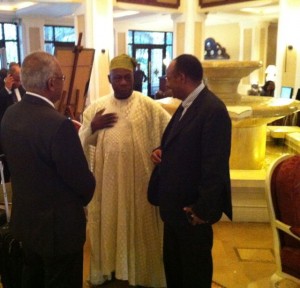
After our visit to the Grand Palace we went back to the hotel where we would bump into former Nigerian President Olusegun Obasanjo, another African titan who in the early years, between him, Mr. Zenawi, Presidents Joaquim Chissano of Mozambique , Thabo Mbeki of South Africa and of course Mr. Kagame, commanded respect and gravitas that transcended both national and continental politics. Soon after our random encounter, it was clear that the lobby of the Sheraton Hotel was filled with many distinguished African and international heavyweights. The presence of all these influential leaders demonstrated how important Mr. Zenawi was to Africa and the world. Mr. Zenawi was a man who commanded respect from the continent. Many people I spoke with whole heartedly believed that Africa lost a real leader and visionary…however, as a someone indicated “he was not a statesmen” but “he had to be one of the smartest African leaders on the continent.” Indeed.
The day before the state funeral can only be summarized by what my father told me in explaining his thoughts of the day: “The mood in Addis has been depressing and moving, depressing in the sense that we have come to Addis and we find a country in shock. Here is a man that by any standard of admission should be alive, but on the other hand, the warmth and the affection displayed by the population is infectious (at the Palace). You can’t stop feeling part of those who mourn and this is due to the warmth that many Ethiopians exude.”
The Burial of a ‘Visionary’
The last time I attended a state funeral was in 1999 when former President Julius K. Nyerere passed away. Although I was only 13 at the time, I understood the magnitude of what was going on. Ironically, the last time I saw both Mr. Zenawi and Mwalimu Nyerere was when they were at our house in Addis Ababa. Mwalimu, as we informally called him, was passing through on his way to London and so Mr. Zenawi came to the Africa House residence to meet him. This had to be in 1998 but I’m not quite sure. I was very sure, though, that I was witnessing something quite special. I never saw the two leaders again.
At 7am on September 2, 2012 we made our way to Meskel Square where the official state funeral ceremony was being held. At the lobby of the Sheraton, one diplomat was surprised by the sheer number of UN officials present. A UN envoy responded: “We have to honor him.” This exchange was telling as it was a testament that those who will miss Mr. Zenawi the most are the envoys and negotiators dealing with Ethiopia’s neighbors, who have faced years of political upheaval and conflict.
Leaving for Meskel Square was a protocol nightmare and I felt sorry for the drivers who were being constantly yelled at as they shuttled Presidents back and forth. At Meskel Square, there were portraits and posters of Mr. Zenawi everywhere we looked. Even in his absence it still felt as though he was watching over Ethiopians. Most of the proceedings were done in Amharic. Quick tangent, anytime I hear someone speaking Amharic I think about the missed opportunity I had in learning such a unique language while living in Ethiopia for 12 years. 12 years!!!! Headsets were provided for translations but of course they ran out the moment I had asked for one. To provide some comic relief to a tense and somber environment I saw many heads bob up and down as people were dozing off with the headsets I could have used.
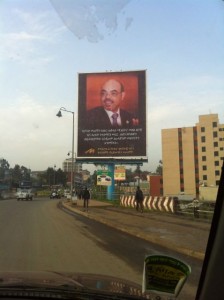
The speeches that were made provided a powerful lineup. President Yayi Boni of Benin, who spoke in his capacity as Chairman of the African Union, started the presidential lineup after the Deputy Prime Minister Hailemariam Desalegn said a few words. The presidential lineup: President Museveni, President Omar Bashir, President Kagame, President Jacob Zuma, President Goodluck Jonathan, President Salva Kiir, former President Mbeki. Ambassador Susan Rice and representatives of the European Union and United Nations also made speeches.
There was a common thread throughout all the speeches. The terms ‘vision,’ ‘transformation’ and ‘son of Africa’ were used in some shape or another in all the speeches. However, as I told Mr. Zitto Kabwe, Kigoma North MP-CHADEMA (Mr. Kabwe shares his views on Mr. Zenawi here), who was seated beside me, the word ‘vision’ was mentioned the most and it demonstrated that vision was synonymous with Mr. Zenawi. Two speeches really struck me, the remarks by President Kagame and Ambassador Rice, for two very contrasting reasons but both with the same message.
The most symbolic moment was when President Kagame paid his respect to the late Prime Minister before heading to the podium to share his remarks. Standing tall he honored Mr. Zenawi from one rebel to another, one comrade to another and one brother to another. I don’t think we will ever understand the kind of relationship these two leaders had but Mr. Kagame’s words were sincere. “Meles was uncompromising when his people’s interests were concerned.” Mr. Kagame continued, “he was sometimes misunderstood, not because he was wrong, but because he was ahead of many in these matters (the socioeconomic transformation of Ethiopia).”
After I asked Mr. Kabwe about his thoughts and perspectives of from the funeral he said: “I was emotionally moved by President Kagame’s speech and how he described Meles as being uncompromising on fundamental issues. Almost the whole Africa was in Addis today and only because Meles delivered. Not every Prime Minister or President is buried by as many friends and foes like Meles was today. The message was clear, vision and inspiration.”
The remarks by Ambassador Rice were heartfelt. Ambassador Rice worked closely with Mr. Zenawi during her period with the Clinton Administration. “Meles had a world class mind” she said, “he was not just brilliant. He wasn’t just a relentless negotiator and a formidable debater. He wasn’t just a thirsty consumer of knowledge. He was uncommonly wise – able to see the big picture and the long game, even when others would allow immediate pressures to overwhelm sound judgment.” I was not surprised at the level of intimacy Ambassador Rice expressed, after all, the two spent hours and hours negotiating, battling and debating ways Ethiopia and Eritrea could coexist. It was interesting how there was no real mention of Eritrea during any of the speeches, at most only concerning how Meles won the war against Eritrea. I believe Eritrea missed an opportunity to rekindle its relationship at least with the Ethiopian people and express its concern not from an envoy but from the President himself. There was much disappointment amongst African and international diplomats in the way Asmara responded to the death of Mr. Zenawi.
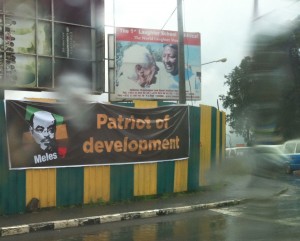
It was unfortunate that the proceedings closed with a speech by the former Deputy Prime Minister that lasted over an hour long about the life of Mr. Zenawi. This lost the crowd and for a moment overshadowed what was a very respectable ceremony. It didn’t help that on the main projectors they had people watching from Bahar Dar (it looked forced, with people waving Ethiopian flags) but then a few minutes the exact same clip was played again except with ‘London’ captioned underneath. Such instances only fuel the sentiment that the grieving and celebrations around the country were a bit over the top and orchestrated.
Azeb Mesfin, the widow of the late Prime Minister, made her closing remarks. I could not understand what she was saying. However, it was obvious she was making a rallying call, indicating that Mr. Zenawi’s legacy will live on, the party will live on and the transformation of Ethiopia will continue. This was similar to what President Mbeki said during his speech, that “your [Meles] race is ran but the struggle continues.” As I was flipping through a photographic history of Mr. Zenawi’s life, distributed to all the delegates, I came across a telling quote by Mr. Zenawi that captured both the sentiments of Mrs. Mesfin and Mr. Mbeki:
“Our struggle is not a marathon but more akin to a relay race where those who ran earlier pass on the baton to those who came earlier.”
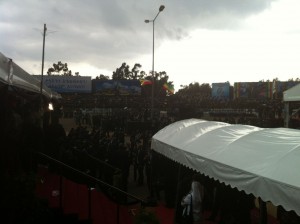
Who will picks up the baton from Mr. Zenawi before it drops?
After Mrs. Mesfin’s speech Meskel Square was darkened by heavy clouds and a heavy downpour began. It rained, and it rained hard. At that point, it was hard to tell whether the storm was just passing through Addis signifying a status quo and continuation of Ethiopia’s current trajectory or that the storm was here to stay and a period of uncertainty and instability lies ahead.
It’s Not All Organic
After the state funeral, I thought it was time to get out of the Sheraton-Jupiter-Radisson area and explore my old stomping ground. I called up a friend of mine and we went for a cruise together. I was able to see my old high school and thereafter see the impressive new Chinese built African Union building. I think the politics, symbolism and financial implications of this project deserves its own blog but I have to say it is quite imposing and commands respect and admiration.
My candid conversation with my friend was interesting. My friend told me that the past two weeks, the mourning, the crowds, the strong praise and even the numerous posters of Mr. Zenawi across the country was not all organic. “People are mourning him not specifically because of his policies but rather because he was their leader. For some people, Meles was all they knew.” My friend described the current criticism that is applied throughout the proceedings concerning the mourners, is it all real? Are people being paid or told to cry? My guess is as good as yours but my friend did tell me “in the countryside there have been cases where children in school have been asked to write poems and to congregate around city centers and have been asked to cry, which is completely fine. But this revisionist history is a bit troubling. The insincerity of what happened is also bothersome, he was sick, then he was ok, and now he’s dead. What happened?” I sensed some frustration and even disappointment from what my friend was saying. “Meles didn’t have to do too much, he could have just opened the country a little bit and allow more freedoms, without compromising his leadership, I guarantee you more people would have flocked the streets and mourned him. I would have even done so.”
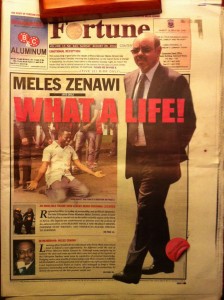
I was hoping to get some indication of what happened to Mr. Zenawi but no one was talking or even speculating. I am sure things will come out later as the internal dynamics of Mr. Zenawi’s party shape up. Until then, we are left with accolades, narratives and the constant debate we Africans are left with. Can development and democracy coexist in the African context? Is strong leadership the only solution we have at the expense of strong institutions? If the answer is yes, then what happens when the individual suddenly and abruptly dies or becomes obsolete? We are then operating at a loss and some of the economic and social changes that were implemented risk being undone.
We Africans need to decide whether we can and should move away from the strong-man model/individual leadership and move towards the collective: emboldening institutions. We also need to decide whether we want collective development at the expense of individual freedoms or vice versa. We need to make a choice but I ask, can we have it all? Strong leadership, institutions, democracy and sustainable development? I struggled with this question over the weekend and so far I’m leaning towards no we cannot have it all.


A very personal and pleasant piece to read Ahmed. Shukran. RE: Democracy vs. Development – In my opinion, the balance exists in their co-existence. Democracy should ideally give way to the freedom and ability to speak aloud; all other freedoms and abilities could follow from this. And the more capability people have to voice their concerns and be heard, the more “development” happens (at least according to what’s been discussed on this blog by Bihemo and Amartya Sen). So, can we have it all? From a microeconomic perspective I agree with you that no, we can’t have it all. But we could eventually work towards having it all by focusing on on freedoms as capabilities.
I think you touched something so key to our development as Africans with this statement, “An overreliance on a single individual, no matter how cerebral he or she may be, is always a risky affair.” We need to get out of our Savior mentality and change our mindset so we can move towards a progressive sustainable change.
A brilliant piece of personal reflection and political analysis. Well done comrade!
Ahmed –
I re-read your article. A balanced and well written. I agreed with most of the things you discussed in the article. The bottom line is – he was a brilliant mind who achieved tremendous economic development in the country but on the human rights side his legacy will be much more questionable. Until the election of 2005, the political reform and freedom of the press had made a significant progress but after the chaos that followed the 2005 election – that progress came to a complete halt. As you alluded in your article – this could be “mostly due to fear of exposure and allowing slight freedoms that could potentially destabilize all of the progress made.” Mr. Meles Zenawi was a keen student of history and to a large extend his advocated the China Model – Economic development with limited political reform. In a way – you can make the argument that democracy – especially in countries like Ethiopia and Rwanda where the society is loosely held with a lot of historical tension among the different ethnic groups – might be a hinderance to rapid Economic development.
I concur with you that Mr. Meles Zenawi will be missed more by the region – East Africa – than by Ethiopia. In the last few years – he and his party have laid down the frame work for industrial driven economic growth and transformation. Whoever comes to power will continue to follow in the footsteps of Meles Zenewi. The bigger challenge is whether East Africa can find someone of Meles’ intellect, nimbleness, international clout and diplomatic ability to guide East Africa as it faces many economic and security challenges. Meles was actively involved in all the major issues in East Africa. His role in Sudan was particularly commendable. As a father of the peace accord between Khartoum and Juba, Meles possessed the international political clout, the inside knowledge of Sudan and the diplomatic skill to bring the two warring sides to a peace agreement. He was a man who was trusted by both sides. Sudan is still work in progress and it will be hard to replace him. His role and work in representing Africa at all the major world conferences both at the G8 and G20 will be dearly missed.
I like your discussion of whether the immense outpouring of deep sorrow “was organic”. I, personally, believe it was to a large extent organic. Although the constant 24/7 propaganda on the state TV did help in transforming Meles from PM into a hero. The sad part for me was Meles didn’t live long enough to know how much people loved him. I think the reason majority of people in Ethiopia were so moved by his loss is the fact that this was an unassuming man – man who devoted his life to Ethiopia. Even his critics would admit that he lived and died for his country. He joined the armed the struggle at the age of 19 and died 37 years later still fighting for his people. In recent times – he had on several occasions expressed his strong desire to leave office and get some well earned rest. He was a brilliant man – world class mind. He had wanted to write a few books after leaving office. In 2006, he presented a 51 page paper “AFRICAN DEVELOPMENT: DEAD ENDS AND NEW BEGINNINGS” which he planned to expand to a book. This was a man who strived to lift the nation as a whole without enriching himself or his family. He was a simple and honest man. His family still lives in a small town in the Northern city of Adwa. They are as poor as they were 20 years ago. His wife Azeb said something that I thought was profound. “Meles had a special place for his family but he never had a special time for his family. His time was devoted to the country…. His family understood he was a man on a mission and never competed for his time”. Many wished he at least got a few more years to spend with his wife and family. He died way too young. He will be missed dearly.
If it is still not clear – I was a big fan:).
May he rest in peace.
@ Jack D, thank you for your comments. I think the debate of democracy versus development is of course an age old one but it really had me thinking after the death of President John Atta Mills of Ghana and how the institutions there allowed for a smooth transition with no problems. I understand that Ethiopia had a smooth transition but this was the first bloodless one in Ethiopian history. Sometimes institutions are essential to keep the development process moving even though it is usually leadership that guides it. Democracy in Africa cannot be like Democracy in the US and Europe, simply because of the tensions that exist within our society.
@Gloria thanks, one thing though is that there is such a thirst for good and effective leadership in our continent that sometimes people think its ok to give up some freedoms if it means they can transform their country. I’ve heard many times how we need more President Kagames and a Meles in Tanzania. This is all and good but we have to understand the consequences of all this, would Tanzanians be willing to give up the immense freedoms we have now? Are we willing to take a step back, a huge one for that matter, in order to become a middle-income country?
@Aidan thanks very much comrade!
@Gebre I responded on Facebook. I think we were all in some way big fans of Meles.
This is a brilliant piece. Well written and very informing.
I think the nexus between democracy and development is a real one for Africa. I believe the balance can be seen when democracy is sowed, watered and cared for so it can germinate and actually grow- development then will be one of its edible and lasting fruits. I know the believers of the dependency theory will not necessarily agree with me since they convincingly argue that even the West sidelined democracy in their earlier quest for development. But as Gloria said there is the need for us as Africans to move past the Savior mentality where one man is considered to have all the answers so sustainable development can be achieved.
When Obama visited Ghana sometime back, he made a comment that i can’t help but agree with that Africa does not need strong men but rather strong institutions. If we allow the institutions to work, i believe in time every thing will fall in place. it may be wishful to think we can have it all but it is possible if African leaders will allow Democracy to operate and of course the institutions to function then development might eventually appear.
@Franka Thank you for your comments. We definitely need to move on from the Savior mentality but sometimes it is essential for some countries to do so in order to proposer; that is when things get tricky. President Obama’s comment about Africa not needing strongmen but strong institutions was a telling statement but it was just a statement, I do not think US policy will shift in that regard. These ‘strongmen’ are the ones that push their geopolitical interests at the expense of democracy.
These things do take time so we will see how these next few years play out. Critical elections in Kenya and Tanzania, at least for East Africa, will be very telling.
I commend you on your article it contains a lot of quality information and is well done.
Gerald, thank you for your comment.